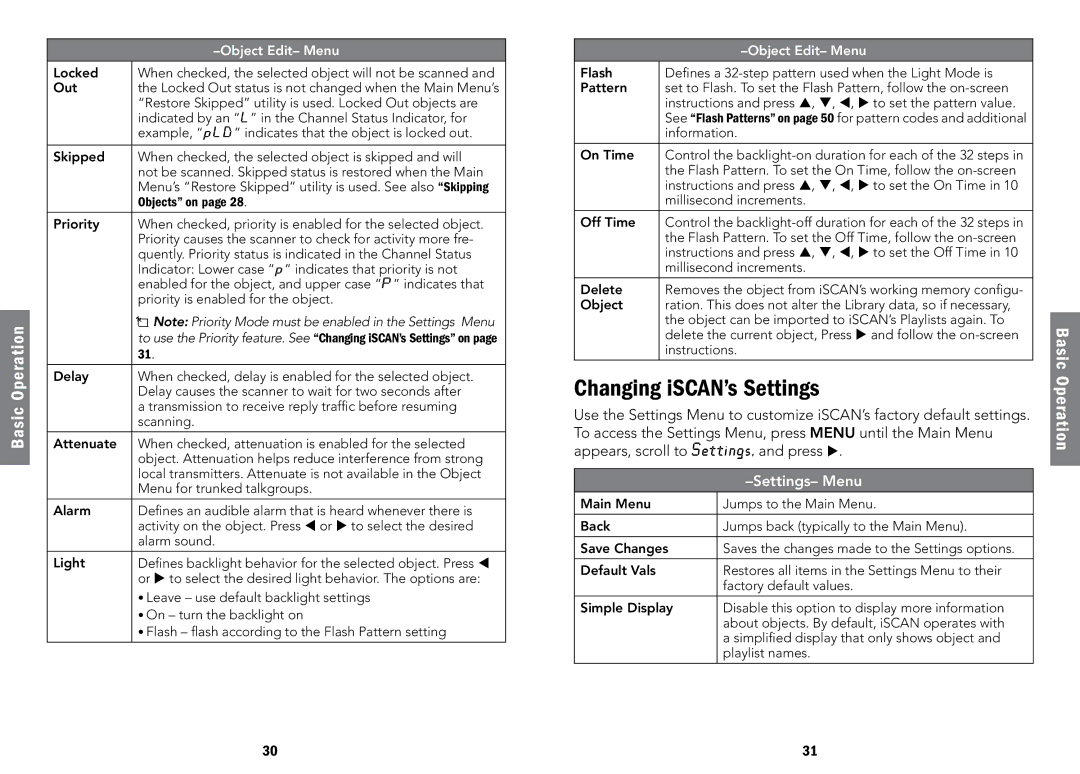
|
|
|
|
|
| Locked | When checked, the selected object will not be scanned and |
|
| Out | the Locked Out status is not changed when the Main Menu’s |
|
|
| “Restore Skipped” utility is used. Locked Out objects are |
|
|
| indicated by an “L ” in the Channel Status Indicator, for |
|
|
| example, “p L D ” indicates that the object is locked out. |
|
|
|
|
|
| Skipped | When checked, the selected object is skipped and will |
|
|
| not be scanned. Skipped status is restored when the Main |
|
|
| Menu’s “Restore Skipped” utility is used. See also “Skipping |
|
|
| Objects” on page 28. |
|
| Priority | When checked, priority is enabled for the selected object. |
|
|
| Priority causes the scanner to check for activity more fre- |
|
|
| quently. Priority status is indicated in the Channel Status |
|
|
| Indicator: Lower case “p ” indicates that priority is not |
|
|
| enabled for the object, and upper case “P ” indicates that |
|
|
| priority is enabled for the object. |
|
|
| n Note: Priority Mode must be enabled in the Settings Menu |
Operation |
|
| |
|
| to use the Priority feature. See “Changing iSCAN’s Settings” on page | |
|
|
| |
|
|
| 31. |
|
|
|
|
|
| Delay | When checked, delay is enabled for the selected object. |
|
|
| Delay causes the scanner to wait for two seconds after |
Basic |
|
| a transmission to receive reply traffic before resuming |
|
| scanning. | |
| Attenuate | When checked, attenuation is enabled for the selected | |
|
|
| object. Attenuation helps reduce interference from strong |
|
|
| local transmitters. Attenuate is not available in the Object |
|
|
| Menu for trunked talkgroups. |
|
|
|
|
|
| Alarm | Defines an audible alarm that is heard whenever there is |
|
|
| activity on the object. Press or to select the desired |
|
|
| alarm sound. |
|
|
|
|
|
| Light | Defines backlight behavior for the selected object. Press |
|
|
| or to select the desired light behavior. The options are: |
|
|
| • Leave – use default backlight settings |
|
|
| • On – turn the backlight on |
|
|
| • Flash – flash according to the Flash Pattern setting |
|
|
|
|
|
|
Flash | Defines a |
Pattern | set to Flash. To set the Flash Pattern, follow the |
| instructions and press , , , to set the pattern value. |
| See “Flash Patterns” on page 50 for pattern codes and additional |
| information. |
|
|
On Time | Control the |
| the Flash Pattern. To set the On Time, follow the |
| instructions and press , , , to set the On Time in 10 |
| millisecond increments. |
|
|
Off Time | Control the |
| the Flash Pattern. To set the Off Time, follow the |
| instructions and press , , , to set the Off Time in 10 |
| millisecond increments. |
|
|
Delete | Removes the object from iSCAN’s working memory configu- |
Object | ration. This does not alter the Library data, so if necessary, |
| the object can be imported to iSCAN’s Playlists again. To |
| delete the current object, Press and follow the |
| instructions. |
|
|
Changing iSCAN’s Settings
Use the Settings Menu to customize iSCAN’s factory default settings. To access the Settings Menu, press MENU until the Main Menu appears, scroll to Settings, and press .
|
|
Main Menu | Jumps to the Main Menu. |
|
|
Back | Jumps back (typically to the Main Menu). |
|
|
Save Changes | Saves the changes made to the Settings options. |
|
|
Default Vals | Restores all items in the Settings Menu to their |
| factory default values. |
Simple Display | Disable this option to display more information |
| about objects. By default, iSCAN operates with |
| a simplified display that only shows object and |
| playlist names. |
|
|
Basic Operation
30 | 31 |
